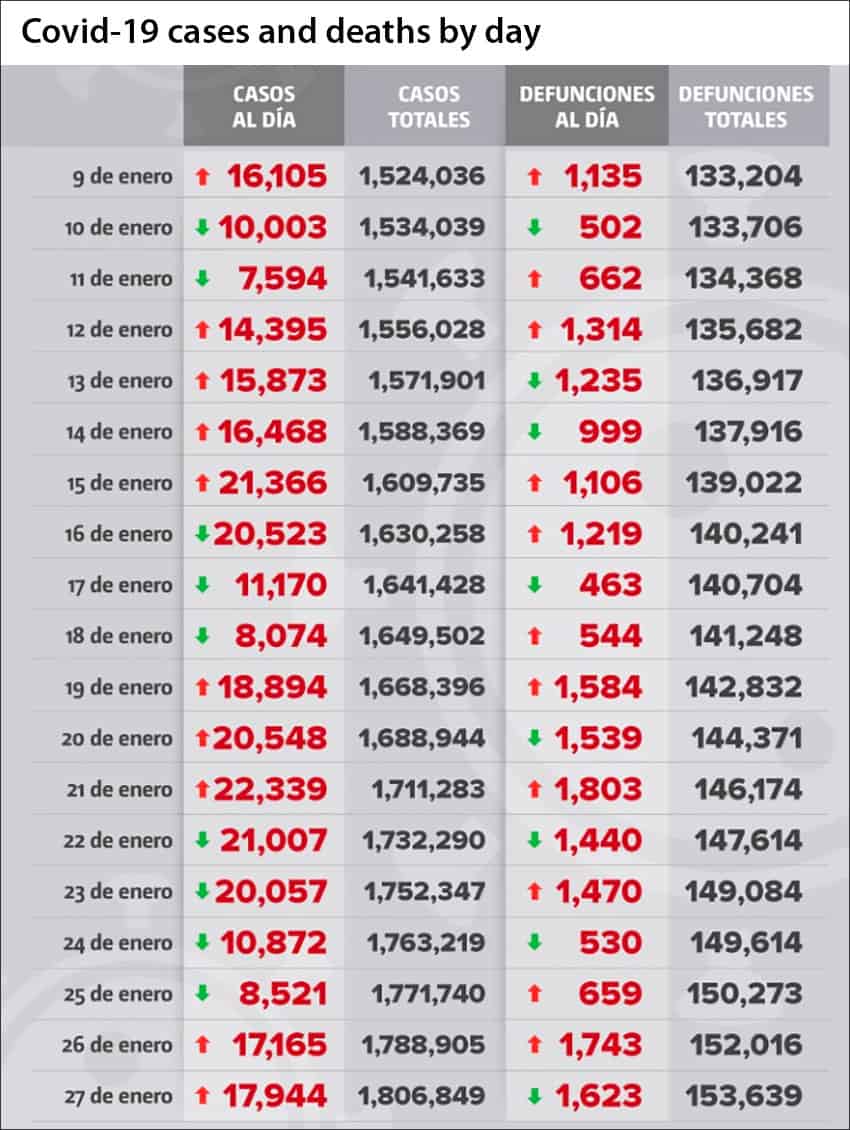Mexico has ranked second to last among 98 countries in a “Covid Performance Index” developed by an Australian think tank to measure the effectiveness of pandemic responses around the world.
Developed by the Lowy Institute, the index tracked six measurements in the 98 countries for which data was available: confirmed cases, confirmed deaths, confirmed cases per million people, confirmed deaths per million people, confirmed cases as a proportion of tests and tests per thousand people.
The period examined spans the 36 weeks after each country’s 100th confirmed case of Covid-19 using data available to January 9, 2021. Mexico recorded its 100th case on March 18 last year.
The Lowy Institute used the six indicators to calculate a score out of 100 for each of the 98 countries.
“A score of 100 indicates that a country achieved the best average score across the six indicators compared to all other countries examined at a comparable point in time. Conversely, a score of 0 indicates that a country had the worst average score at a given moment during the pandemic,” the think tank said.

Mexico’s score was 6.5, placing it 97th among the 98 countries, ahead of Brazil, which achieved a score of 4.3. Brazil ranks second in the world for total Covid-19 deaths with more than 220,000 whereas Mexico currently ranks fourth with more than 153,000. Mexico’s death toll will likely soon pass that of India, which currently ranks third. The United States ranks first with almost 430,000 fatalities.
Brazil ranks third for confirmed coronavirus cases with just under 9 million, according to data compiled by Johns Hopkins University, while Mexico ranks 13th with just over 1.8 million. However, Mexico’s accumulated tally is considered a significant undercount due to the low testing rate.
The presidents of both Mexico and Brazil have repeatedly downplayed the threat of the coronavirus, opposed strict lockdowns and failed to advocate forcefully for face masks. Another thing that President López Obrador and Jair Bolsonaro have in common is that they both contracted the virus, the former just days ago.
The other countries among the 10 worst ranked by the Lowy Institute were Colombia, Iran, the United States, Bolivia, Panama, Oman, Ukraine and Chile.
New Zealand, which has only recorded about 2,000 cases since the start of the pandemic and just 25 Covid-19 deaths, was ranked first for the effectiveness of its pandemic response with a score of 94.4 out of 100. The island country implemented a strict lockdown at the start of the pandemic and closed its border to most foreigners while maintaining a tight quarantine program for returning citizens.
Vietnam ranked second followed by Taiwan, Thailand, Cyprus, Rwanda, Iceland, Australia, Latvia and Sri Lanka. China was not included in the rankings due to a lack of publicly available data on testing, the Lowy Institute said.
The think tank noted that the coronavirus pandemic has affected the Americas (North and South) more than any other continent.
It said that smaller countries with populations of fewer than 10 million have consistently performed better in managing the pandemic than their larger counterparts. Mexico has a population of 126 million, according to 2020 census results, and one of the largest cities in the world in Mexico City, which has been the country’s coronavirus epicenter since the start.
The Lowy Institute also said that richer countries unsurprisingly had more resources available to fight the pandemic and performed better on average than developing countries for most of the crisis to date. However, it noted that “the relatively ‘low-tech’ nature of the health measures used to mitigate the spread of the virus to date, including large-scale lockdowns, may have created a more level playing field between developed and developing countries in the management of Covid-19.”
Mexico implemented a national social distancing initiative between late March and the end of May, which entailed the suspension of nonessential economic activities, but it never enforced a hard lockdown involving restrictions on people’s movement. Since early June, a stoplight system has been used to guide restrictions but freedom of movement has remained largely unaffected.
The Lowy Institute also examined the success or otherwise of different political systems in managing the pandemic.
“Despite initial differences, the performance of all regime types in managing the coronavirus converged over time,” it said.

“On average, countries with authoritarian models had no prolonged advantage in suppressing the virus. Indeed, despite a difficult start and some notable exceptions, including the United States and the United Kingdom, democracies found marginally more success than other forms of government in their handling of the pandemic ….”
Mexico’s federal government, the fourth since a new era of democracy began in 2000 with the end of the the Institutional Revolutionary Party’s quasi-dictatorial, seven-decade rule, has maintained that people must retain their right to freedom amid the pandemic and as a result hasn’t enforced curfews or travel restrictions as some other countries have, or issued a federal mask mandate.
“The most important thing is freedom,” López Obrador said late last year when asked about a federal lawmaker’s refusal to wear a face mask during a meeting.
“People have to decide freely [what to do] and have confidence in [their fellow] Mexicans because they always act wisely, the people are wise,” he said.
The federal government has been widely condemned for its pandemic response, with much of the criticism focusing on Mexico’s low Covid-19 testing rate and the failure to enforce a strict lockdown.
The publication of the Lowy Institute’s performance index comes just after the news agency Bloomberg updated its “Covid Resilience” rankings. Mexico ranked last among the 53 countries included in Bloomberg’s index, which used 11 indicators to assess the coronavirus situation in individual countries and their government’s effectiveness in handling the pandemic.
Mexico News Daily